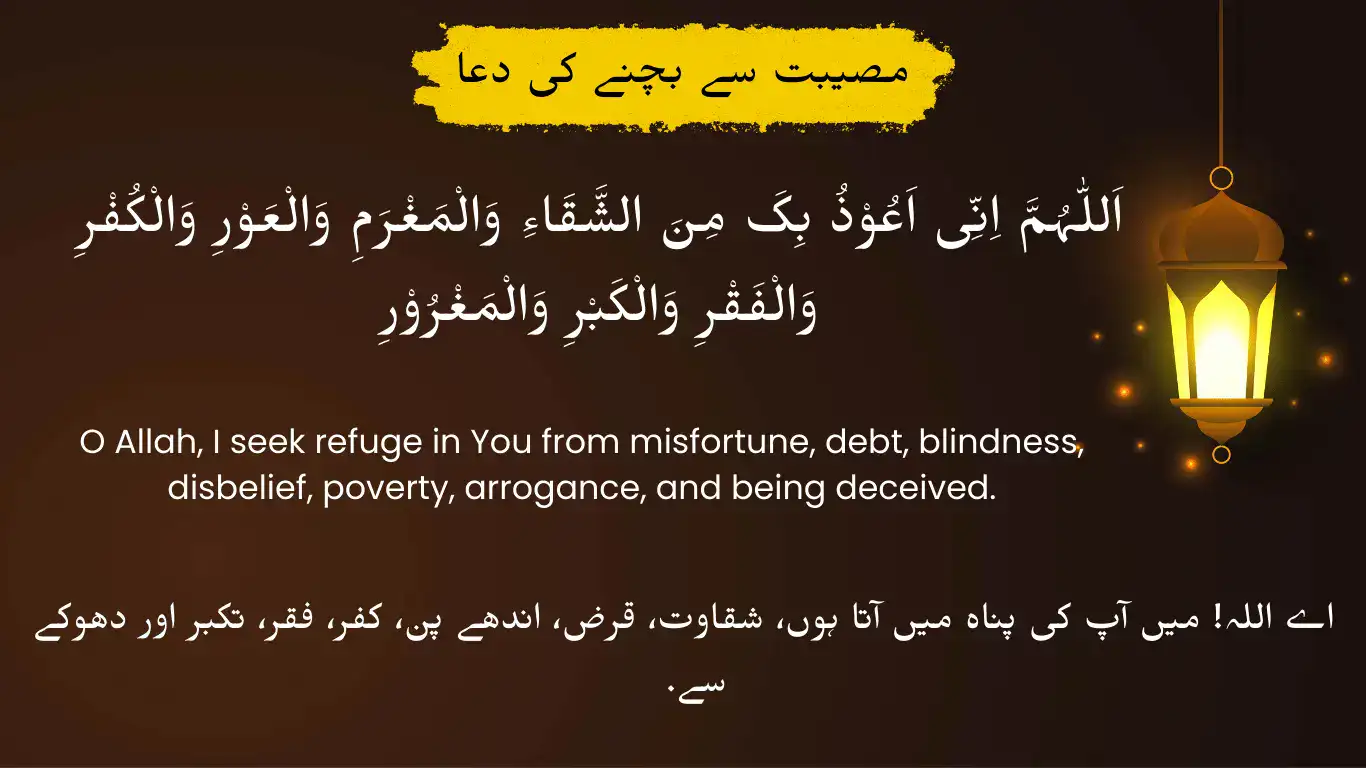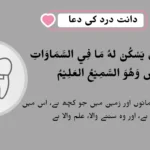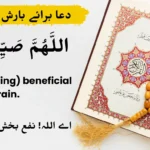Duas (supplications) play a vital role in the life of a believer, offering comfort and a means of seeking Allah’s assistance during difficulties. One such powerful supplication is the Dua of Prophet Yunus (AS), famously recited for relief from hardships and calamities. This article provides a detailed breakdown of the Musibat Se Bachne Ki Dua, along with its meaning, significance, and benefits.
| Darood Sharif Text in Arabic | درود شریف |
| Azan ke Baad ki Dua with Urdu and English |
| Dard Ki Dua: Prayer for Relief from Pain |
| Maghfirat Ki Dua –Seeking Forgiveness |
Full Text of Musibat Se Bachne Ki Dua
Arabic:
لَا إِلَـٰهَ إِلَّا أَنتَ سُبْحَانَكَ إِنِّي كُنتُ مِنَ الظَّالِمِينَ
Transliteration:
La ilaha illa Anta Subhanaka inni kuntu minaz-zalimeen.
English Translation:
“There is no deity except You; exalted are You. Indeed, I have been of the wrongdoers.” (Surah Al-Anbiya, 21:87)
Urdu Translation:
لَا اِلٰهَ اِلَّا أَنْتَ سُبْحَانَكَ اِنِّىْ كُنْتُ مِنَ الظّٰلِمِيْنَ
(اے اللہ!) تیرے سوا کوئی (سچا) معبود نہیں، تیری ذات پاک ہے، بےشک میں قصوروار ہوں۔
Significance of This Dua
This supplication is a profound prayer of repentance and acknowledgment of Allah’s greatness. It was recited by Prophet Yunus (AS) while he was in the belly of the whale, seeking Allah’s mercy and forgiveness. This dua is particularly significant for:
- Seeking Relief: It is a powerful remedy for those facing hardships and seeking Allah’s help.
- Repentance: It emphasizes humility and turning to Allah with sincerity.
- Acknowledging Mistakes: By reciting this dua, one admits their shortcomings and seeks forgiveness.
Analysis of the Verses
1. “لَا إِلَـٰهَ إِلَّا أَنتَ”
Transliteration: La ilaha illa Anta
- Meaning: “There is no deity except You.”
- Explanation: This part of the dua acknowledges the oneness of Allah, affirming His absolute sovereignty. It reminds believers that only Allah has the power to alleviate suffering.
2. “سُبْحَانَكَ”
Transliteration: Subhanaka
- Meaning: “Exalted are You.”
- Explanation: This phrase glorifies Allah’s perfection and highlights His purity, free from any imperfections or faults.
3. “إِنِّي كُنتُ مِنَ الظَّالِمِينَ”
Transliteration: Inni kuntu minaz-zalimeen
- Meaning: “Indeed, I have been of the wrongdoers.”
- Explanation: This is a confession of one’s errors and a demonstration of humility before Allah. It signifies a believer’s repentance and plea for mercy.
Benefits of Reciting Musibat Se Bachne Ki Dua
- Relief from Hardships: This dua is a source of comfort and hope during challenging times.
- Acceptance of Prayers: It is a dua praised in the Quran, making it highly effective in seeking Allah’s blessings.
- Spiritual Growth: Regular recitation strengthens faith and fosters a deep connection with Allah.
- Forgiveness: It is a powerful supplication for seeking Allah’s pardon and mercy.
When and How to Recite This Dua
- In Times of Distress: Recite this dua whenever you feel overwhelmed by difficulties.
- After Salah: Incorporate it into your daily prayers, especially during Sujood (prostration).
- During Tahajjud: The quiet moments of the night are ideal for supplicating with sincerity.
Practical Tips for Using This Dua
- Recite it with full concentration and faith in Allah’s mercy.
- Repeat it consistently, especially during trials.
- Encourage family members to learn and recite this dua.
FAQs:
Yes, this dua can be recited for all kinds of difficulties, whether financial, emotional, or spiritual, as it is a general supplication for relief and forgiveness.
While reciting in Arabic is ideal, the meaning and essence can also be expressed in one’s native language during personal supplications.
There is no fixed number, but repeating it frequently with sincerity increases its effectiveness.
Conclusion
The Musibat Se Bachne Ki Dua is a timeless supplication that serves as a beacon of hope for Muslims facing challenges. Rooted in the story of Prophet Yunus (AS), it emphasizes humility, repentance, and the unparalleled power of Allah. By incorporating this dua into daily life, believers can find solace, spiritual growth, and a closer relationship with Allah.




